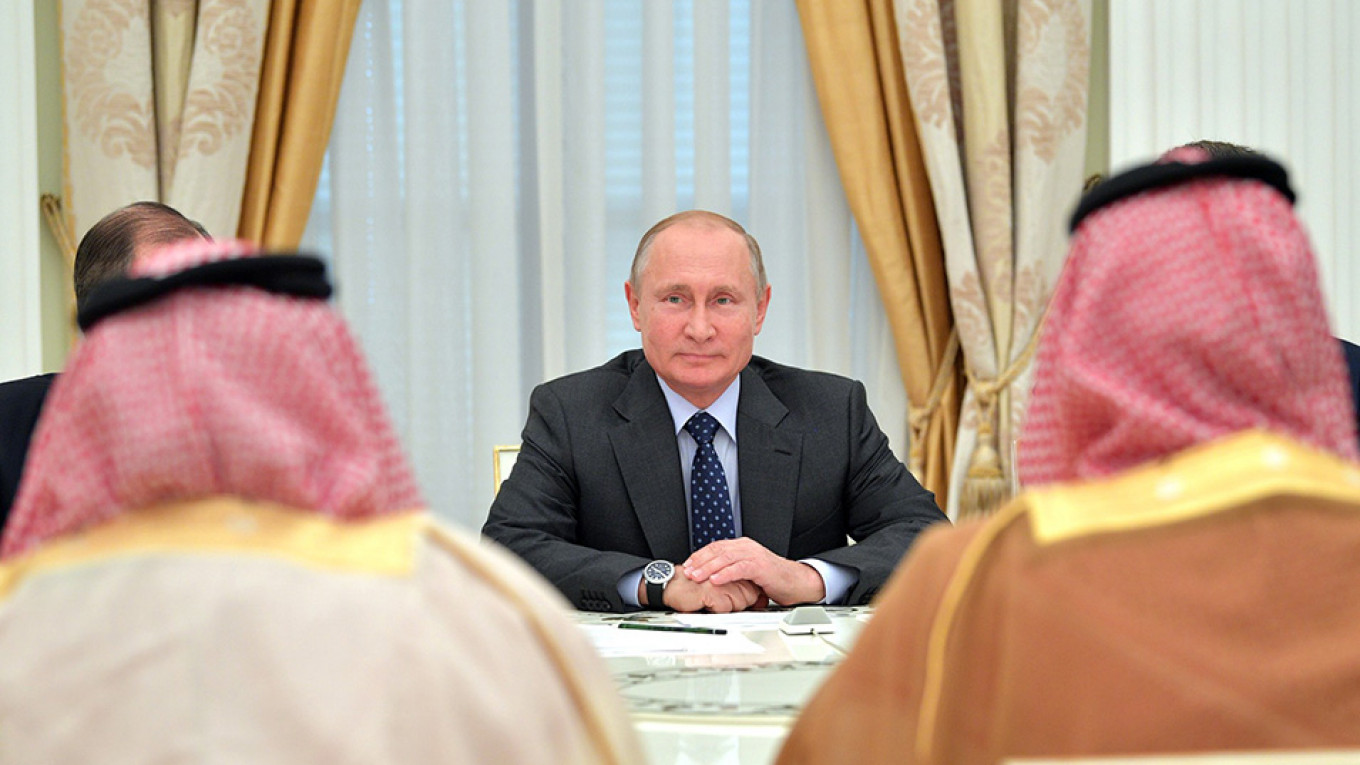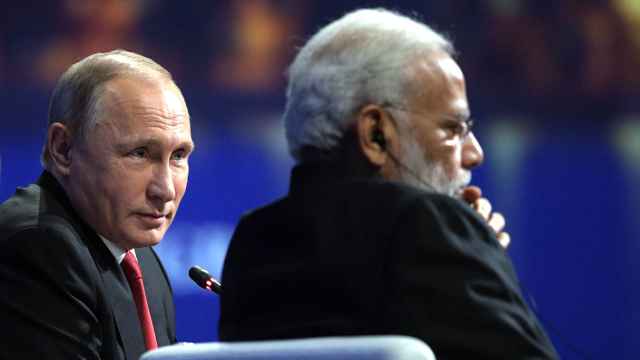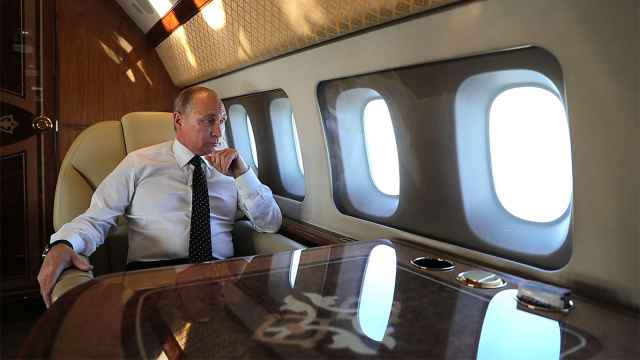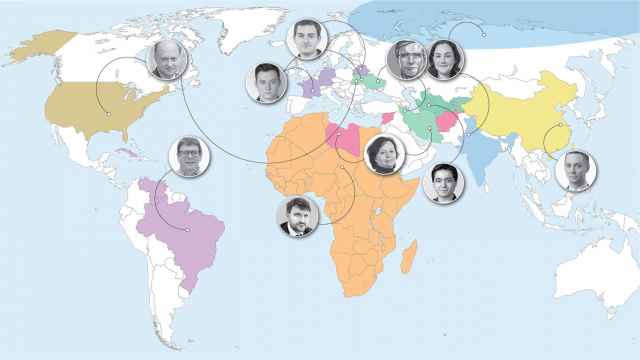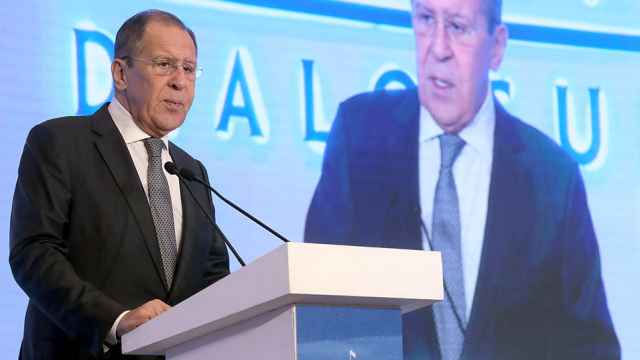Vladimir Putin is due to arrive in Saudi Arabia Oct. 14, 2019. The Russian president made his only trip to Riyadh way back in 2007, and the two leaders have refrained from top-level visits until Saudi King Salman bin Abdul-Aziz Al Saud made a historic first visit to Russia in October 2017.
One must bear in mind that the Saudi monarch had never traveled to Moscow during the Soviet era. Formal bilateral ties were severed in 1938 following the execution by Stalin of Karim Khakimov, who was called “Red Pasha” — an outstanding Soviet diplomat, the ambassador to Saudi Arabia and a personal friend of King Ibn Saud.
It is not only the geopolitical landscape but also the gradually broadening agenda for b ilateral talks that stir up interest in Putin’s trip. Both countries’ officials reported intense preparatory work ahead of the leaders’ meeting.
“I am convinced that the Russia-Saudi summit will give further strong impetus to our multifaceted partnership, contribute to its qualitative growth and strengthen mutual understanding between the two peoples,” Russian Foreign Minister Sergey Lavrov said on the eve of the visit.
The signing of the OPEC deal to cut the global oil supply has significantly bolstered bilateral relations in recent years. Moscow and Riyadh as the key signatories have managed to stabilize oil prices by constantly interacting on a pragmatic note and monitoring the market. According to official estimates, Russia’s revenues from the collaboration have reached $100 billion.
“About 30 agreements and contracts will be signed during President Putin’s visit to Saudi Arabia. We are working on it. These are investment projects, and the sum in question is billions of dollars,” Russian Energy Minister Alexander Novak said in early October.
Kirill Dmitriev, CEO of the Russian Direct Investment Fund (RDIF), also shared his vision, noting that Russia and Saudi Arabia are planning to sign agreements in the energy sector as well as in technology, culture and investment. The RDIF has become a major Russian negotiator as joint investments were discussed with Riyadh represented by the Public Investment Fund, the sovereign wealth fund of Saudi Arabia. The two organizations established a long-term strategic partnership in 2015 approving investments worth over $2.5 billion (out of the allocated $10 billion).
In October, the RDIF was reported to have opened its first foreign office — and not coincidentally, it was in Saudi Arabia. Among the potential investment projects, the parties mention the acquisition of a large stake in Novomet, the Russian oil equipment manufacturer by the RDIF and Saudi Aramco, the Saudi oil giant. It is believed to be 30% of shares. Russian Gazprom is discussing projects in natural gas conversion. More specifically, officials promise to speak about new projects and contracts in greater detail during Putin’s visit to Riyadh.
Moscow and Riyadh will also have to address a wide range of regional security issues from the Gulf to Syria to Yemen. Putin's visit coincides with the Saudi authorities’ efforts to ease tensions in the Gulf region. Saudi Crown Prince Mohammed bin Salman is reported to have consented to the leaders of Pakistan and Iraq acting as intermediaries in talks between Riyadh and Tehran. Moscow could join this process. Riyadh’s steps and its stated readiness to de-escalate with Iran is fully compatible with the collective security framework for the Gulf region presented by the Russian Ministry of Foreign Affairs.
The Yemen issue particularly stands out as a grave security concern. Lavrov voiced Moscow’s official position on the matter by noting that inclusive talks are “the only way to resolve the difficult situation in Yemen, which, according to the United Nations, is facing a humanitarian disaster.” Although Saudi Arabia and the United Arab Emirates declare efforts to seek alignment on Yemen, they have been largely fruitless so far. Given the on-the-ground situation, Russia is leaning toward the UAE and the Southern Transitional Council, which seized power from the Aden-based government of President Abed Rabbo Mansour Hadi. Nevertheless, Moscow has maintained contact with all the players, including the Sanaa-based alliance led by Houthis. The policy of equidistance contributes to Moscow’s working contacts both on a local and regional scale, and Russia expects to work this position during Putin’s visit.
The Syria peace process will be a key item on the Moscow-Riyadh agenda. The launch of a Syrian constitutional committee was announced earlier in September, thereby marking the start of a political process. Turkey is gaining more leverage over the Syrian opposition, yet Putin recently signaled Moscow expects the Saudis to play their role.
Moscow could suggest that Riyadh take a more active role. With the ascendancy of two regional players, Iran and Turkey, Russia deems it important to the balance of power in Syria.
Moreover, Moscow will work toward convincing Riyadh to facilitate Damascus’ return to the Arab League.
Foreign Minister Lavrov has been pushing forward with the idea of Syria’s return to the Arab League since early 2018. As of now, Moscow’s main task is to persuade the Saudis to embrace the idea, which Russia expects would be followed by regional recognition of the Syrian government.
In turn, this would not only impact the regional diplomatic landscape but also bring about partial international recognition. Riyadh’s willingness to meet Moscow and Damascus halfway could make it possible for Saudi Arabia and Syria to re-establish ties and, more importantly, strengthen the regional standing of both nations.
The Saudis once showed themselves capable of pragmatism, and Bahrain, which resumed diplomatic work with Syria, can be regarded as a litmus test of the necessity to follow suit. Otherwise, the thinking in Moscow is that Saudi Arabia can find itself among those trying to catch up with the rest. As not only are other players, the UAE in particular, reopening their embassies in Damascus, but they are also taking part in international fairs held in the capital. Emirati and Omani businessmen were not alarmed at the US decision against dealing with Assad’s regime.
Should the Saudis agree to facilitate Syria’s comeback in the Arab League, Qatar will remain the only player to resist it. Yet the Doha-Damascus relationship is getting stronger, and should Russia be properly engaged in the process, the problem can be settled.
Russia has emerged as a major outside player claiming to preserve its presence in the Middle East. This new environment could not but render the existing trend in Russia-Saudi Arabia relations irrelevant. Under new circumstances, Moscow and Riyadh have more capability for productive cooperation and compromise on those issues that the parties still diverge on. Until recently, the Saudis used their relationship with Russia to tease Washington. As for the current situation, it testifies to the two countries’ trying to find common ground for bilateral cooperation free from third parties.
This article early appeared in RIAC.
A Message from The Moscow Times:
Dear readers,
We are facing unprecedented challenges. Russia's Prosecutor General's Office has designated The Moscow Times as an "undesirable" organization, criminalizing our work and putting our staff at risk of prosecution. This follows our earlier unjust labeling as a "foreign agent."
These actions are direct attempts to silence independent journalism in Russia. The authorities claim our work "discredits the decisions of the Russian leadership." We see things differently: we strive to provide accurate, unbiased reporting on Russia.
We, the journalists of The Moscow Times, refuse to be silenced. But to continue our work, we need your help.
Your support, no matter how small, makes a world of difference. If you can, please support us monthly starting from just $2. It's quick to set up, and every contribution makes a significant impact.
By supporting The Moscow Times, you're defending open, independent journalism in the face of repression. Thank you for standing with us.
Remind me later.



